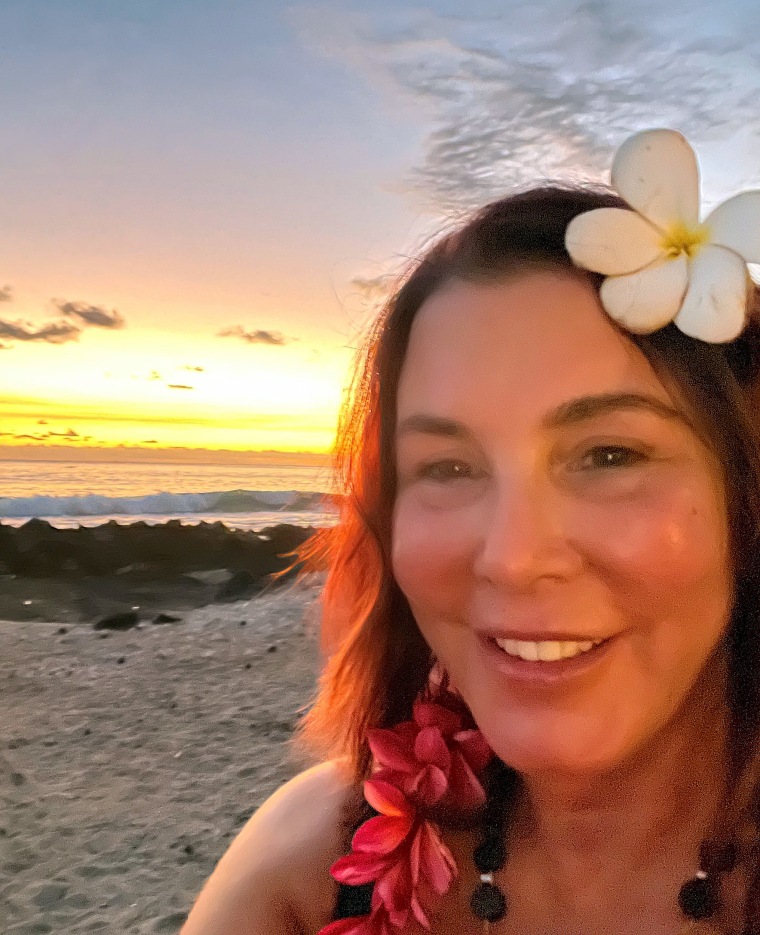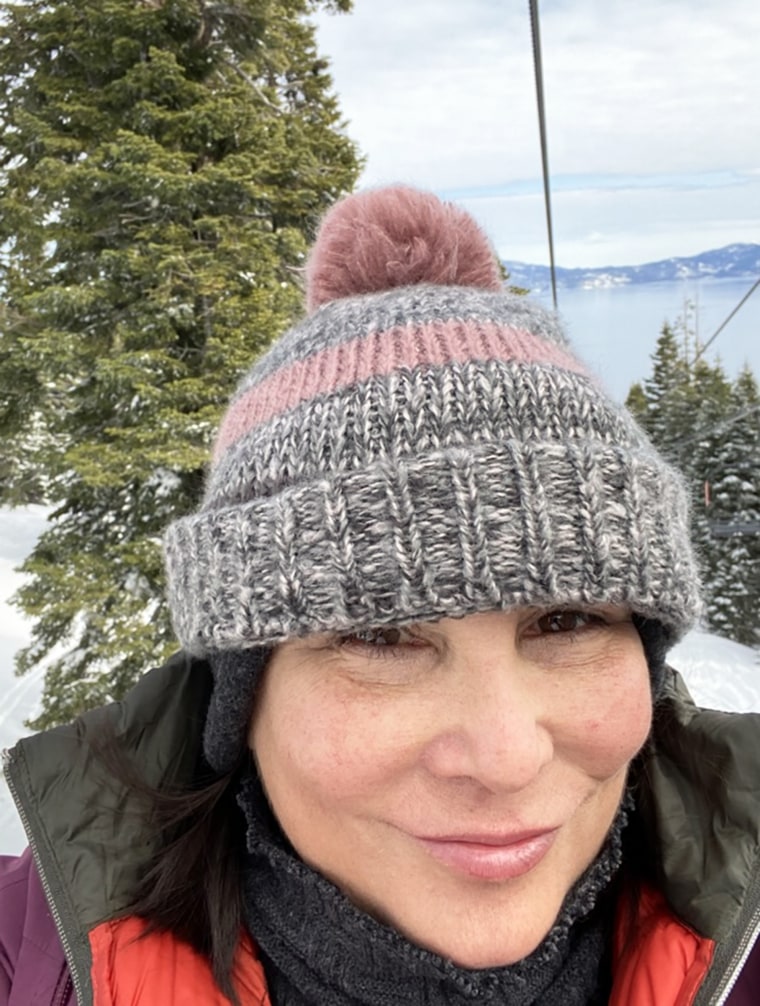As Tania Rodrigues drove to work one morning in January 2024, something unusual happened with her vision.
“All of a sudden, I was looking through a kaleidoscope or perhaps like a fly’s eye,” the 66-year-old from Marin County, California, tells TODAY.com. “Everything that was in front of me on the road was now in multiples.”

Worried, Rodrigues visited the emergency room, where she underwent an MRI and a CT scan. Doctors soon knew what caused Rodrigues’ fractured vision.
“He said, ‘You have Stage 4 lung cancer with two brain (metastases),” she says. “I don’t know what I was expecting to hear, but that wasn’t it. I was floored.”
Sudden Vision Problems
When Rodrigues, then 64, was commuting to work that day in January 2024, she felt great. She rolled the widows down and listened to music as she drove. But then her vision splintered and she saw multiples in front of her, so she pulled over for the roughly 10 seconds it lasted. After calling her brother, she decided to go to the emergency room.
“The ER doctor asked me a bunch of questions,” she recalls. Initially, “everything that I answered didn’t seem to alarm him.”
But then he inquired if she felt numbness, and she said she had “a little teeny bit” along her jawline. That response “concerned him,” so he sent her for the scans. Rodrigues felt surprised that when he returned, he was so certain of the diagnosis.
“He said, ‘I know what’s going on with you,’ which I hate hearing that from doctors because that means they absolutely know what it is,” she says.
He told her she had Stage 4 lung cancer that spread to her brain. Rodrigues felt stunned because she had no symptoms at all and had not smoked for decades.
“I am generally in excellent health,” she says. In fact, the year before her diagnosis, she’d had a lung x-ray because of a flutter in her heart, and it didn’t detect anything in her lungs.
The emergency room doctor admitted Rodrigues to the hospital so she could undergo more testing to determine what type of lung cancer she had. Scans revealed the cancer had spread from a nodule in her lung to her liver, the base of her spine, to two ribs and her brain, where she had 47 metastases.
“There was an element of shock in there,” she says. “I’ve gratefully had a meditation practice for a really long time, and the very first thing that struck me when he said (my full diagnosis) was like, ‘Oh that’s what they’ve been talking about all this time, about impermanence.’”

Doctors characterized her visual impairment as a seizure, even though she didn’t experience other symptoms, and they put her on an anti-seizure medication. Rodrigues cancer was a type that occurs more often in people who have never smoked, called EGFR-positive non-small cell lung cancer.
Rodrigues qualified for a targeted therapy, and every day, she took a pill until it became ineffective in December 2024.
“It worked as long as it worked and then it stopped working,” she says. “But the good news was that it got rid of almost every single brain metastases.”
Another node on her lung has appeared, though, and the metastasis on her liver returned. Her team of doctors recommended another targeted therapy and chemotherapy, which she receives in an infusion once every three weeks.
“This has been great,” she says. “The second node on my lung is gone. The primary node is reduced.”
Non-Smoking Lung Cancer on the Rise
As the number of people who smoke has decreased, so has the number of people with smoking-caused lung cancer. At the same time, experts have noticed an increase in young people, mostly women, with non-smoking lung cancers, Dr. Danny Nguyen, a medical oncologist and hematologist at City of Hope in California, tells TODAY.com.
The causes of lung cancer in non-smokers remain unclear, and researchers are trying to understand why it occurs.
“In terms of risk factors, I think it’s hard to really pinpoint right now,” Nguyen says. “Some of these risk factors include potentially radon (exposure), pollutants in the air.”
Non-smokers who get lung cancer often have a mutation in a gene called the epidermal growth factor receptor (EGFR) gene, which can cause the cancer to grow.

Several targeted therapies work effectively on managing Stage 4 EGFR lung cancers. A recent phase 3 clinical trial shows that a combination of two therapies, Rybrevant and Lazcluze, increased survival for patients with metastatic lung cancer, he says.
“We definitely have those patients that are on that trial who are still alive right now because of that trial,” Nguyen says. “There are many other clinical trials for lung cancer as well.”
Having treatments that work for patients diagnosed later remains essential as many people do not have symptoms until their cancer has progressed. Even then, the most common symptoms, such as a cough, are usually a sign of more benign conditions, and doctors often consider those before lung cancer.
“What I’ve seen is a lot of these patients may present with a cough that just doesn’t go away,” Nguyen says. “They try antibiotics, they try inhalers and try steroids. It maybe gets better for a little bit then comes right back.”
Current screening recommendations for lung cancer only apply to smokers.
“A lot of times these patients don’t look like they should have lung cancer,” Nguyen says.
Many patients are like Rodrigues and learn they have cancer when a scan for something else picks up a mass in the lungs. Doctors should consider lung cancer especially if patients present with symptoms — such as coughing up blood or a persistent cough — because it can impact anyone.
“If you have lungs, you can get lung cancer,” Nguyen says.
‘My Life is Full’
Thanks to her years of meditation, Rodrigues quickly accepted that rest of her life will always include cancer treatments. Since starting on the new therapy, she has felt better and returned to doing things she loves.
“I trained in martial arts. I did it for years and years, almost 20,” she says. “My training slipped off … I started back at training in martial arts.”
Having cancer has changed her perspective on life. She appreciates nature more, noticing that the “greens are brighter,” and that people are “way more interesting.”

“My life is full,” she says. “I am really grateful that I get to take a spin on this globe.”
Rodrigues also feels lucky that recent research has allowed for numerous “advancements for the treatment of cancer.”
“If someone had gotten this news even 10 years ago, it would have been a totally different situation than it is today,” she says. “Today, I have a lot of hope.”
Source link


